During a recent visit to Egypt, U.S. Deputy Secretary William Burns congratulated the people of Egypt on the election of Mohammed Morsi, the first democratically elected president in Egypt's history.
Deputy Secretary Burns stressed the significance of the democratic transition underway in Egypt. “Not all nations carry Egypt’s strategic and historic weight,” he said. “And not all nations can have such an important impact on the entire region through the success of their democratic transition, and through their continued role as a strong pillar of peace, security, and prosperity.”
The United States will seek to help ensure a successful democratic transition in Egypt, which offers the best means for the Egyptian people to realize their aspirations for economic opportunity, dignity, security, and a voice in their own affairs.
The United States understands that many Egyptians are concerned about expanding their economic opportunities. “The U.S,” said Deputy Secretary Burns, “is fully committed to tangible initiatives to help Egypt deal with its economic challenges, including meeting immediate financial concerns, providing debt relief, helping to create jobs and educational opportunities, and encouraging U.S. investment and tourism.”
Egypt has traveled a remarkable distance, but a great deal of work remains to build a durable democratic system. It will be critical to see a democratically elected parliament in place and an inclusive process to draft a new constitution that upholds universal human rights. The challenge remains to build institutions that will ensure that no matter who wins an election in any particular year, the rights of all Egyptians will be protected.
The international community will join tens of millions of Egyptians looking to President Morsi and the cabinet he forms to take needed steps to advance national unity and build an inclusive government that embraces all of Egypt’s faiths, including the Coptic Christians, and respects the rights of women and secular members of society.
The United States is committed to working with Egypt’s president, its new government and all parties to sustain a strong, democratic and economically vibrant Egypt that is a force for peace and stability in the region.




